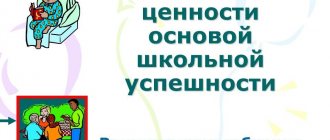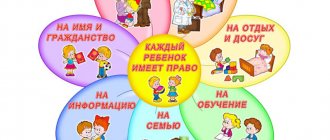Advice for parents: Reward or punish
Consultation for parents “SYSTEM OF REWARDS AND PUNISHMENT IN INTERACTION WITH A CHILD”
Consultation for parents “System of reward and punishment in interaction with a child for parents will be useful for class teachers, teachers and psychologists of educational institutions.
The purpose of the consultation: prevention of child abuse, formation of constructive interaction between parents and children, harmonization of child-parent relations.
Consultation for parents SYSTEM OF REWARDS AND PUNISHMENT IN INTERACTION WITH A CHILD Punishments... The less the school or family needs these, sometimes necessary, but always medicinal and therefore poisonous drugs, the better.
K.D. Ushinsky It is difficult to imagine a family where there would be complete indifference to the good or bad deeds of children.
As a rule, we monitor the activities of children and evaluate their behavior. We do this with the help of encouragement or punishment, competition. Encouragement—expressing a positive attitude toward children's behavior—is important. — How do you feel when you are encouraged and praised? (joy, pride). Encouragement causes a feeling of satisfaction, joy, pride, a desire to behave even better, increases authority in the eyes of others, and contributes to the development of self-esteem. Punishment is a method of education aimed at overcoming children’s wrong actions and bad habits of behavior A.S. Makarenko wrote: “A reasonable system of penalties is not only legal, but also necessary. It helps to develop a strong human character, fosters a sense of responsibility, trains the will, the ability to resist temptations and overcome them.” - What do you think, should a child be punished?
For what, and what should the punishment be? How often do people try to raise children with punishment... But a punished child is a suffering child.
The child needs to be helped much earlier, that is, before punishment, so that he can avoid it. The sad results of punishment are if the teacher sets himself the task of intimidating or intimidating a child, especially when it comes to spanking. Children who are brought up with physical punishment become uncontrollable. Physical punishment is not only hurtful and humiliating, but also teaches that violence is an acceptable expression of one's anger. Constantly explain to the teenager why you want to punish him, try to behave tactfully and calmly, without shouting or aggression. Intemperance, where adults follow their mood, causes great harm to mutual understanding between adults and children. Hence the clashes and swearing. Shouting and rudeness most often provoke a response in children. And he begins to perceive such behavior as natural, and behaves accordingly at school and in society. This creates the basis for a broader conflict between the younger generation and others. Great harm to mutual understanding between children and adults is caused by what can be called rancor: protracted discussions of misdeeds, frequent reminders of past sins. When all the previous ones are “attached” to the current offense, there will be no benefit. By arranging numerous discussions of conflicts, adults create an atmosphere of mistrust around the child. Rules of educational measures 1. Make it a rule never to leave unpunished violations of your guidelines and restrictions by children. If he feels that in some cases he can get away with it, he will often behave in an inappropriate manner. 2. Do not threaten him with a certain punishment for his offense, if you cannot fulfill your threat - he will simply stop taking you seriously. 3. Do not show undue attention to the child’s bad behavior, because it only provokes him. It is important to say in this case what punishment is appropriate for the offense. — What punishments do you use?
(condemnation, restriction, deprivation, compensation)
It is important to set reasonable restrictions: 1. Clear wording of the restrictions. Restrictions will be more effective if they are specific and in a positive rather than negative tone. For example, the phrase “Don’t put clothes on the sofa” leaves the child with the opportunity to throw clothes elsewhere. “Take off your clothes and take your clothes to your room” would be much clearer. 2. Compliance with age restrictions. As the child grows up, rules and restrictions need to be reviewed. The rules must also take into account the child’s experience. 3. Restrictions should not infringe on dignity. Restrictions should not instill in children a feeling of hopelessness and despair, or hatred of adults. 4. Constraints must be feasible. Before you formulate a general rule, think about how you can control its implementation and what you will do if the prohibition is violated. When you make up rules that you cannot or will not control, you give children the opportunity to not pay any attention to these rules. If the ban is violated, there are two main types of sanctions: • Deprivation. Forbid your child for a short time from doing things in which he has crossed all boundaries (watching TV, chatting with friends, going for a walk). • Reimbursement. If any damage is caused, it must be compensated or minimized. Rules for conflict-free discipline of a child There are several rules that help establish and maintain conflict-free discipline in the family. Rule 1
Rules (restrictions, requirements, prohibitions) must be in the family of every child.
This is especially useful to remember for those adults who strive to upset children as little as possible and avoid conflicts with them. As a result, they begin to follow the lead of their own child. This is a permissive parenting style. Rule 2
There should not be too many rules (restrictions, requirements, prohibitions).
This rule presupposes a special sense of proportion, the special wisdom of an adult in resolving questions about “can”, “should”, and “cannot”. Rule 3
The tone in which a requirement or prohibition is communicated should be friendly - explanatory rather than imperative.
Any prohibition of what a child wants is difficult, and if it is pronounced in an authoritative, aggressive tone, it becomes doubly difficult. So, to the question “Why is it not possible?”, you should not answer: “I command it,” “It’s not possible and that’s all!” You need to briefly explain: “It’s too late,” “It’s dangerous.” The explanation should be short and repeated once. Rule 4
It is better to punish a child by depriving him of good things than by doing bad things to him.
It is better to limit him in some way than to physically punish him. Rule 5
The demands of adults should not come into clear conflict with the most important needs of the child.
For example, adults are often annoyed by the “excessive” activity of children: they jump a lot, open, take apart, dance, listen to music. All these are manifestations of children’s natural needs for movement, cognition, and exercise. They need to run, move, and try their hand much more than we adults do. Prohibiting such actions is like blocking a deep river. It is better to take care to direct its flow in a convenient and safe direction. RECOGNIZING GOOD BEHAVIOR Praising and rewarding children is important. No matter how easy it is to raise a child, you definitely need to notice when he behaves well, and express gratitude and praise for it. Notice mostly good traits in your child, and your relationship will become more positive and trusting. In order for rewards to be effective, use them more often than harsh educational measures. Praise your children 5-10 times more often than you scold them. Always try to describe your child's worthy actions from a positive point of view, focusing on his correct actions. Unfortunately, bad behavior is easier to notice. Some adults make a big mistake, often applying unflattering epithets to a child, calling him stupid, greedy, or a hooligan. The constant use of negative labels creates low self-esteem in a child. — What incentives do you use?
How often do you resort to them? The simplest form of encouragement is praise.
1. Praise should be specific (I like that you cleaned your room, that you took out the trash); 2. Effective praise must be immediate; 3. Effective praise must be sincere (Most children feel false); Praise will be effective if it is not given too often - you cannot “praise” the child. How not to praise • Do not praise for what was not achieved through your own labor - physical, mental or spiritual. The following are not subject to praise: beauty, strength, dexterity, health, ingenuity, intelligence - all these are natural abilities, but praise for courage, bravery, etc. • More than two times for the same thing; • Out of pity, out of a desire to please. Every person, every child needs praise. But everyone has their own norm of praise, their own degree of need for approval. Memo about punishment When punishing, you must remember: - punishment should not harm health, either physical or mental. -if there is doubt: to punish or not to punish; don't punish. - for one offense - one punishment. If many offenses are committed at once, the punishment can be severe, but only one, for all the offenses at once. Warning:
Whatever happens, do not deprive your child of well-deserved praise and rewards. Never take away what was given. - Late punishment is unacceptable. The very fact of detection of an offense is, in most cases, sufficient punishment. - a child should not be afraid of punishment. He must know that in certain cases, punishment is inevitable. He should not be afraid of punishment, but of the chagrin of adults. -Do not humiliate the child. -if a child is punished, it means he has already been forgiven. There is no more talk about previous misdeeds. When punishment is ineffective: - unsystematically (sometimes they punish, sometimes not for the same thing); -if the child is stronger or stubborn; -unexpectedly, they had not been punished before; -if it’s soft, it doesn’t reach.
Workshop for Parents
Determining Effective Limits
Read the description of each situation. Determine what the mistake is, choose the option of a more effective statement. "Lunch is ready! When are you finally going to set the table?” Another option______________________________________________________________ Parents tell the child who is usually the first to come home from school: “As soon as you get home, immediately take out the trash! Another option______________________________________________________________ To a teenager: “I want your room to be cleaned in two minutes, make a mess!” Another option______________________________________________________________ “No, I don’t allow you to ski with a friend. You'll break your leg or run into someone." Another option____________________________________________________________ "You can't go outside until you put your things away." Another option____________________________________________________________
Determining effective restrictions
Answer options 1. There is no need to ask a question, you need to set a task. Better: “Dinner is almost ready. Go set the table." 2. There is no need to demand that the task be completed as soon as the child comes home. Better: “Take out the trash before I get home from work.” 3. Too much work in a short time. Better: “We have guests, please clean your room.” 4. Being too critical assumes failure. Better: “You can go skiing with your friends when you learn how to ski properly.” 5. It is unclear what work needs to be done. Better: “After you make the bed, hang your clothes in the closet and sweep the floor, you can go out with your friends.”
We recommend watching:
Memo for parents of schoolchildren How to help your child do his homework. Memo for parents Business game for parents of schoolchildren. Resolving conflicts in the family. Consultation for parents at school. Sobriety in the family
Similar articles:
Rewarding and punishing children
How to encourage a child in the family. Memo for parents
Types of Praise
1. "Compensation" . Used for those children who are seriously lacking something (physical disability, bad character, failures in life). They should be praised for the good things they have, which have not necessarily been achieved by them on their own (it is better not to abuse such praise, because such children can turn into spoiled despots). 2. “Advance” is praise for what will happen, the anticipatory type. He inspires a person to believe in himself. Our faith turns possibility into reality. Praising for something that is not there is not always the same as telling a lie. It is necessary to praise in the morning and at night. Praise for the slightest attempt to improve yourself. The following types of advance can be distinguished: a) assert that the child does something better, regardless of reality; b) approve of the slightest attempts to overcome oneself and not scold if it doesn’t work out; c) not to notice bad manifestations if they are at the same level, and when things have improved, then notice and praise. When using an advance as a type of praise, you should not cross the line of what is possible and not mislead the child. 3. “Lifting” praise. If we are going to increase the requirements for a child, then we need to start them with praise, as inspiration for new exploits. 4. Indirect approval. Praise that does not seem to be praised, i.e. ask for help, advice, etc. In a conversation with another person, casually say kind words about the child, but so that he hears them. These words should be at the level of stating the child’s merits, but one should not touch on his negative qualities. 5. “Explosion of love” (emergency psychological assistance) . Used in extreme cases when the child is in crisis.








